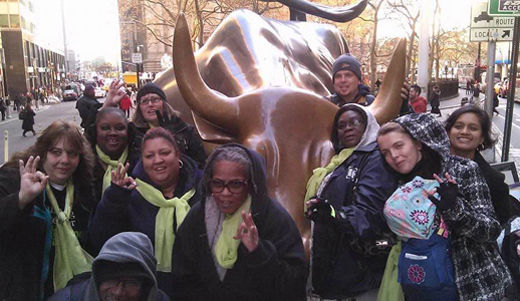
NEW YORK – Disgusted with having to take free food left by customers in collection boxes in their stores and angry about having to go to food pantries to feed their families, Walmart workers across the country and their supporters are fasting during the 15 days leading up to Thanksgiving and Black Friday later this week. They are foregoing food to demand a $15-an-hour living wage and full-time work.
Jennifer Green, one of the fasting protesters outside the penthouse home of the Waltons here, was fired from Walmart while she was pregnant but has remained active with the OUR Walmart campaign. Still, she says, Walmart is the only place close enough to her home in Norfolk, Va. where she can afford to go shopping.
“I went into my old Walmart yesterday to buy Thanksgiving groceries,” she said. “Many of my former co-workers said they want to come by for a plate of dinner at my house but are scheduled to work from 2 to 11 on the holiday.
“My cashier had a miserable look on her face. I told her that I used to work there just like her and that I have been protesting in front of Alice Walton’s house. I told her she was not alone and that people are out here fighting for her.”
“I’ve had to forego meals so my boys have enough to eat,” Walmart worker Jasmine Dixon said last Thursday at a press conference organized by OUR Walmart. “If it wasn’t for food stamps I don’t know what I’d do.”
Some 1,000 workers and supporters have signed up for fasting this week. Some are doing full fasts, consuming only liquids, while others are limiting intake of just certain food items.
“My mother grew up during the Depression and she passed along lessons on how to get through hard times. They are lessons I use today at Walmart,” said Nancy Reynolds, another worker who spoke to the press.
“A lot of times I’ve had to get chicken nuggets because that’s all the money I had,” Reynolds said. She described dividing up one order of nuggets in the break room “because my coworkers were hungry.”
Earlier this year, embarrassed by the attention it was getting for its low wages, Walmart announced it would raise its wages to $10 an hour. By cutting hours though the company pays man workers less money than they were paid before the increase.
Workers still complain they are often not consulted on schedules that they say make it impossible to do more than scrape by week to week. The schedules also don’t allow them to fit in time for second jobs they need to get by.
Walmart relies on taxpayers to foot much of the bill for its workers. Estimates are that a typical large Walmart store, in effect, bills taxpayers $1 million a year for food stamps and welfare payments needed by its underpaid workers.
The hunger strikes this year amount to a stepping up of protests that have been going on for years. Those protests, as they will this year on Black Friday, involve strikes at Walmart stores across the country.
Last year’s Black Friday protests happened at 1,000 stores with actions expected at even more stores this year. Black Friday, the day after Thanksgiving, is traditionally the busiest shopping day of the year.
Photo: Estevan Bassett-Nembhard/PW

MOST POPULAR TODAY

‘Warning! This product supports genocide’: Michigan group aims to educate consumers

Hold the communism, please: SFMOMA’s Diego Rivera exhibit downplays artist’s radical politics

Ohio: Franklin County treasurer attends Netanyahu meeting, steps up Israel Bond purchases

“Trail of Tears Walk” commemorates Native Americans’ forced removal

After months of denial, U.S. admits to running Ukraine biolabs







Comments